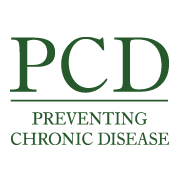PCD News Summary for March 16, 2017

About the Journal
Published every Thursday, Preventing Chronic Disease (PCD) is a peer-reviewed online journal established by CDC’s National Center for Chronic Disease Prevention and Health Promotion. The News Media Branch prepares press summary packets each week. To receive these press summaries on an embargoed basis, send an e-mail to media@cdc.gov. Please note that this e-mail list is for credentialed journalists only. All others, please visit Hookup to Health to sign up for e-mail updates
Notice to News Media – PCD Release Time and Embargo Policy:
CDC’s News Media Branch releases to reporters the PCD media packet every Tuesday afternoon between 12 and 2 pm.
Embargoed until Thursday, March 16, at 12:00 PM ET
Metabolic Syndrome Prevalence by Race/Ethnicity and Sex in the United States, National Health and Nutrition Examination Survey, 1988–2012
More than a third of U.S. adults met the criteria for metabolic syndrome in 2012, a number that has increased by more than 35 percent since 1988. Metabolic syndrome is a cluster of cardio-metabolic risk factors that includes abdominal obesity, high cholesterol, hypertension, and diabetes and is associated with increased risk of chronic diseases such as cancer and cardiovascular disease as well as increased risk of mortality. In 2009, a harmonized definition of metabolic syndrome was established by several health organizations including the International Diabetes Federation, the American Heart Association, and the World Heart Federation. Using this harmonized definition of metabolic syndrome, researchers estimated the prevalence of metabolic syndrome among U.S. adults overall and by race-gender, and assessed changes over the past three decades (1988-2012). They also examined how socioeconomic factors such as income and education influenced the risk of metabolic syndrome.
###
Note: Not all articles published in PCD represent work done at CDC. In your stories, please clarify whether a study was conducted by CDC (“a CDC study”) or by another institution (“a study published by CDC”). The opinions expressed by authors contributing to PCD do not necessarily reflect the opinions of CDC or the institutions with which the authors are affiliated. PCD requests that, when possible, you include a live link to the article in your stories.
###
U.S. DEPARTMENT OF HEALTH AND HUMAN SERVICES
CDC works 24/7 protecting America’s health, safety and security. Whether diseases start at home or abroad, are curable or preventable, chronic or acute, stem from human error or deliberate attack, CDC is committed to respond to America’s most pressing health challenges.